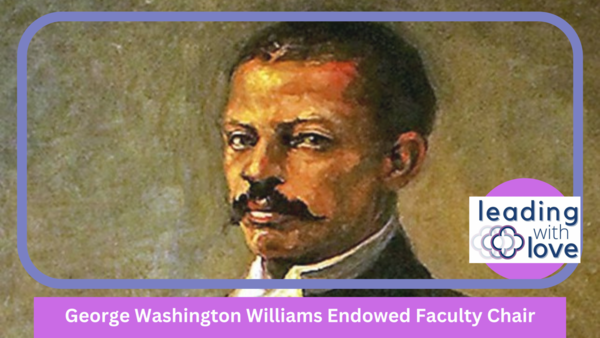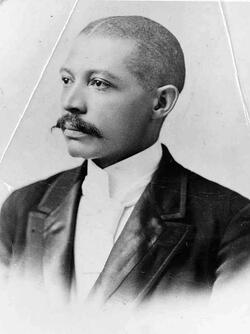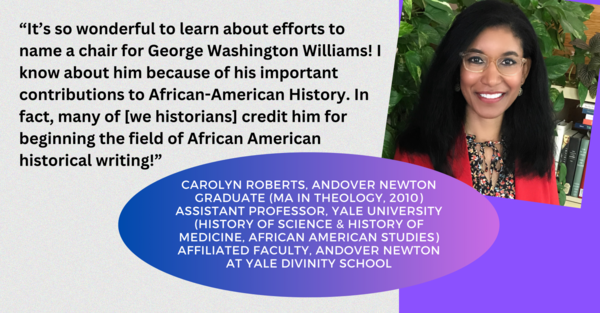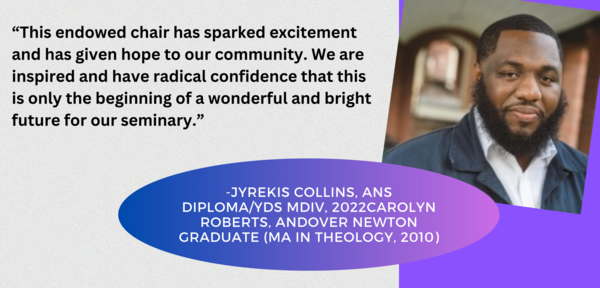George Washington Williams Endowed Faculty Chair

Andover Newton Seminary at Yale Divinity School (YDS) educates future faith community leaders for effective, transformational ministries. The most important long-term investment a school can make in its graduates’ learning is in its faculty.
As a congregational Christian seminary embedded in an ecumenical divinity school, which is itself embedded in a globally renowned university, Andover Newton has access to a faculty treasure trove when offering its educational program. Andover Newton partners with a core group of faculty affiliates in designing, assessing, and implementing its curriculum. At the heart of this community of scholars are two faculty positions stewarded by Andover Newton and charged with upholding the seminary’s mission. One – the Samuel Abbot Chair, which predates even Andover’s 1807 founding – is already endowed.
Andover Newton now seeks to fund and frame its second faculty position so that it attends in perpetuity to faith communities that the academy has marginalized for generations.
While the nation’s churches are richly diverse, mainline North American graduate theological education does not yet reflect this diversity. This disconnect is historic and systemic: those who have historically controlled resources funding graduate theological education have represented only some of those living out the Christian faith.
Funding a new chair at Andover Newton, dedicated to teaching and learning about congregational churches previously at the margins, represents a structural change for both the academy and the church. An endowed faculty chair that names the historic sin of the systemic racism that led to underrepresentation will ensure that Andover Newton continues to address the oppression in which it has been complicit and takes responsibility for this history in a concrete way.
What is an “endowed chair”? Budgets at seminaries and universities dedicate one line to each member of the faculty. The school’s operating budget funds some lines, and others are underwritten by an endowment whose proceeds cover a faculty position’s cost. Faculty budget lines funded by endowments are secure as the economy changes. The restrictions placed on an endowment by donors ensure that a faculty position remains faithful to its founding principles. Therefore, endowed chairs represent a multigenerational commitment on the part of a school to an area of inquiry.
Furthermore, because the endowed chair is widely recognized as the most prestigious honor a university can bestow on a scholar-educator, endowed chairs enable schools like Andover Newton at YDS to attract outstanding talent to the faculty.
George Washington Williams
 George Washington Williams was born free from the institution of slavery in Bedford Springs, PA in 1849. To escape inadequate healthcare, education, and living conditions for Black people of his time, at the age of fourteen, Williams enlisted in the Union Army. Williams fought in multiple wars before being discharged from the United States Army in 1868. With a passion for education, Williams decided to pursue formal training. He began his education at Howard University, a historically Black college in Washington, DC, and later transferred to Newton Theological Institution.
George Washington Williams was born free from the institution of slavery in Bedford Springs, PA in 1849. To escape inadequate healthcare, education, and living conditions for Black people of his time, at the age of fourteen, Williams enlisted in the Union Army. Williams fought in multiple wars before being discharged from the United States Army in 1868. With a passion for education, Williams decided to pursue formal training. He began his education at Howard University, a historically Black college in Washington, DC, and later transferred to Newton Theological Institution.

Williams used his education to shape powerful, accurate, rigorous accounts of African-American history. Scholars today point to his History of the Negro Race in America From 1619 to 1880 as the first comprehensive account of African-American History.

In addition to his military, pastoral, and scholarly achievements, Williams was a civic leader who went on to become the first African American elected to the Ohio State Legislature. In 1889, Williams traveled to Europe as a journalist. He was at first impressed by the work of Belgium’s King Leopold II. When he traveled to Congo Free State in Africa, however, he was saddened by the exploitative conditions he encountered. Williams took an early and controversial stand that shifted the European-African tide. His “Open Letter to His Serene Majesty Leopold II, King of the Belgians and Sovereign of the Independent State of Congo” ended generations of silence surrounding the predatory practices of colonial rule.
Honoring the Legacy
Andover Newton seeks to fund an endowed faculty chair in George Washington Williams’ honor, not only because he was the institution’s first Black graduate, but because his life’s work and achievements continue to inspire us now. Today’s students need and deserve a faculty chair just as inspiring.
A minister who led with love, and who fought the oppressive institutions of slavery and imperialism, George Washington Williams gives us an example of how deeply rooted, radically open Christian faith leadership can change a life and change the world.
Would you like to support the George Washington Williams Faculty Chair?
Contact Dean Sarah B. Drummond.

